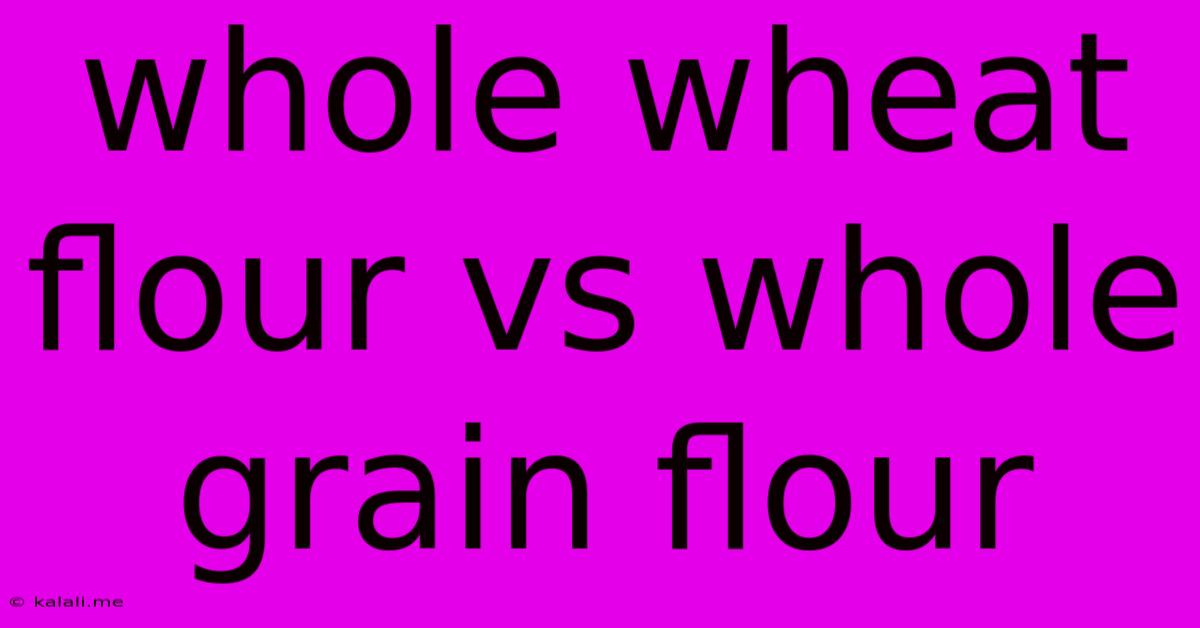Whole Wheat Flour Vs Whole Grain Flour
Kalali
May 25, 2025 · 3 min read

Table of Contents
Whole Wheat Flour vs. Whole Grain Flour: What's the Difference?
Choosing between whole wheat flour and whole grain flour can feel confusing. Both boast nutritional benefits and a hearty texture, but they aren't interchangeable. Understanding their subtle differences is key to making informed baking choices and reaping the maximum health advantages. This article will clarify the distinctions, helping you select the perfect flour for your culinary creations.
What is Whole Wheat Flour?
Whole wheat flour is made by grinding the entire wheat kernel – the bran, germ, and endosperm – into a flour. This results in a flour that retains all the natural nutrients and fiber found in the whole grain. It has a coarser texture and nuttier flavor compared to refined white flour. The high fiber content contributes to a denser, more substantial baked good. Key characteristics include its rich brown color, slightly grainy texture, and distinct whole wheat flavor. Think hearty breads, muffins, and pancakes.
What is Whole Grain Flour?
The term "whole grain flour" is a broader category encompassing flours made from various whole grains, not just wheat. This includes flours from oats, barley, rye, corn, and more. Each whole grain flour possesses its own unique nutritional profile, flavor, and texture. Like whole wheat flour, whole grain flours retain all parts of the grain kernel, offering a rich source of fiber, vitamins, minerals, and antioxidants. However, the specific nutritional benefits and baking properties will vary significantly depending on the grain used. For example, oat flour will be much different than barley flour in terms of taste and texture.
Key Differences: A Comparison Table
| Feature | Whole Wheat Flour | Whole Grain Flour (General) |
|---|---|---|
| Grain Source | Wheat | Various (wheat, oats, rye, etc.) |
| Texture | Relatively coarse | Varies widely depending on grain |
| Flavor | Nutty, slightly sweet | Varies widely depending on grain |
| Color | Brown | Varies widely depending on grain |
| Nutritional Profile | High in fiber, iron, and B vitamins | High in fiber, varies in vitamins & minerals depending on grain |
| Baking Properties | Denser, heartier baked goods | Varies widely depending on grain |
Which Flour Should You Choose?
The best choice depends on your recipe and desired outcome.
-
Whole wheat flour: Ideal for recipes where a hearty texture and slightly nutty flavor are desirable. It's great for breads, muffins, pancakes, and even some cookies. However, substituting it directly for all-purpose flour might alter the texture of delicate cakes or pastries.
-
Whole grain flour: Offers a wider range of options depending on the grain used. Oats flour creates moist and slightly sweet baked goods, while rye flour adds a tangy, robust flavor to breads. Consider the specific grain's properties when selecting a whole grain flour for your baking project. Experimentation is key to discovering which whole grain flour complements your culinary style.
Tips for Baking with Whole Wheat and Whole Grain Flours:
- Start with a blend: Combining whole wheat flour with all-purpose flour can help improve texture and prevent overly dense results.
- Add moisture: Whole grain flours often absorb more liquid, so you may need to add a little extra water or milk to your recipe.
- Don't overmix: Overmixing can lead to tough baked goods. Mix only until the ingredients are just combined.
- Experiment: Try different types of whole grain flours to discover your favorites.
By understanding the distinctions between whole wheat flour and the broader category of whole grain flours, you can confidently choose the perfect flour for your next baking adventure. Embrace the nutritional benefits and unique flavors these flours offer to elevate your culinary creations.
Latest Posts
Latest Posts
-
Craftsman 1 2 Hp Garage Door Opener Troubleshooting
May 25, 2025
-
How To Wire A Light Switch And Outlet
May 25, 2025
-
Expanded Security Maintenance For Applications Is Not Enabled
May 25, 2025
-
Gmail Download Attachments From Multiple Emails
May 25, 2025
-
Where Can I Store Items Skyrim
May 25, 2025
Related Post
Thank you for visiting our website which covers about Whole Wheat Flour Vs Whole Grain Flour . We hope the information provided has been useful to you. Feel free to contact us if you have any questions or need further assistance. See you next time and don't miss to bookmark.